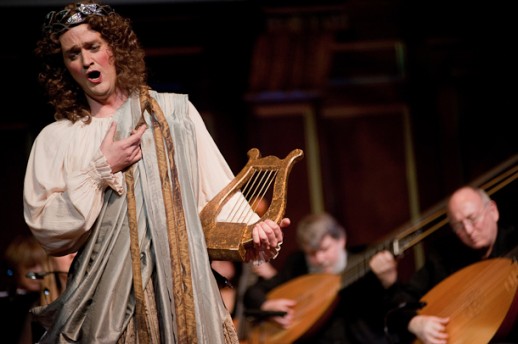
In addition to an annual series of concerts presented in Boston, for the past several years the Festival has also been bringing programs to The Morgan Library in Manhattan and on Monday evening mounted a semi-staging of a pair chamber operas, La Couronne de Fleurs and La Descente d’Orphée aux Enfers by Marc-Antoine Charpentier, at the library’s Gilder Lehrman Hall.
The great figure of French music between Jean-Baptiste Lully and Jean-Philippe Rameau, Charpentier is occasionally seen as a near-failure since he spent most of his life on the periphery of the French royal court, never achieving much sought-after patronage from Louis XIV. While it is true that his opera career was severely curtailed due to opposition from supporters of Lully who found Charpentier’s music too Italianate, particularly compared to that of the Florentine-born(!) creator of French opera, he did prosper, particularly as a composer of sacred music where his deep felt compositions do often betray a sensuousness no doubt influenced by his early tutelage in Italy under Giacomo Carissimi.
Although he wrote only a single tragédie lyrique, the devastating Médée, Charpentier did create many smaller-scale theatrical pieces for his patron, Mlle de Guise. How odd that not three months after Descente’s NY stage premiere by Gotham Chamber Opera—reviewed by our own John Yohalem—we enjoyed a second production, this one led by BEMF music directors Paul O’Dette and Stephen Stubbs with stage direction by Gilbert Blin, costumes by Anna Watkins and choreography by Melinda Sullivan.
Although I’d never heard (nor heard of) Couronne before, Descente, a two-act, hour-length work depicting Eurydice’s death and Orphée’s descent into the underworld, is not unknown; I heard locally twice before performed by Les Arts Florissants, once in 1996 at the Brooklyn Academy of Music and again in 2004 at Alice Tully Hall, both times conducted by William Christie and both with English haut-contre Paul Agnew in one of his best portrayals as Orphée. Named after a Charpentier composition, Christie’s group has done much to raise this composer’s profile over the past 30 years, and its Charpentier recordings on both Harmonia Mundi and Erato are among its best with its Descente a particular glory.
Boston’s forces have also been devoting considerable attention to the French baroque including a recent recording of Charpentier’s well-known Actéon paired with another of his settings of the Orpheus legend, Orphée descendant aux enfers; I don’t know that BEMF recording but an earlier one
by the late French countertenor Henri Ledroit and the Ricercar Consort is hauntingly beautiful.
Monday at the Morgan Library revealed just how challenging this subtle French baroque music can be: while the rambunctious Couronne—a slight pastorale exclusively concerned with praising Louis—was capably done, one missed a more refined touch in Descente, a sweetly touching if truncated gem—an expected third act seems to have not survived. In the small orchestra which occupied center-stage throughout, the violins were perhaps too extroverted, the oboes too pungent. The exception to the overall gusto was the eloquent trio of gambas which accompanied Orphée’s quietly devastating imprecations in the underworld, pleas so transporting the chorus eventually proclaimed “The Happiness of the Underworld will make the Heavens jealous!”
The singers of Descente too were accomplished and apt if occasionally missing the most tender nuances, notable exceptions being the plaintive trio of condemned souls, sung by Jason McStoots, Zachary Wilder, and Tyler Duncan and particularly the urgent Orphée of Aaron Sheehan whose sensitive high tenor lacked the usual airiness of an haut-contre but whose subtle shaping of his exhortations to the fervent Pluton of Jesse Blumberg would have melted even the heart of the most implacable god.
Period recreations of 17th and 18th century works tend to be vapid and artificial, but Blin’s choices were about as effective as I have seen, although I would have liked a rigorous approach to baroque gesture—each singer seemed to be on his or her own. The four dancers merged seamlessly into the scene, with the singers joining easily into some of the larger dance numbers. Costumes and wigs capably evoked the 17th century but were not always ideally flattering: Sheehan’s wig in particular did him no favors.
I suspect that after two stagings this year of Descente we might have to wait at least another decade before we hear it again, but despite some rough-and-tumble moments it was an entertaining evening, although the fragmented presentation proved baffling and ineffective. The first section of Couronne opened the evening, followed by the first act of Descente; the second act of Descente followed intermission after which the finale of Couronne closed the show. Alarmingly, the blissful ending of Descente was followed by the long and noisy entrance of a figure who introduced the conclusion of Couronne; this egregious misstep ruined a musical highpoint. Surely, doing Couronne for the first half and Descente after intermission would have been a simple solution.
The Boston Early Music Festival has just added Couronne and Descente to its extensive discography on the cpo label but the recording is not yet widely available in the US; however, copies were on sale at Monday’s concert and will be so again at Tuesday’s.
Although he has officially now dropped out of the April 2 performance of Rameau’s Platée with Les Arts Florissants at Lincoln Center, Christie remains listed as conductor for Juilliard 451’s upcoming performances of Charpentier’s Actéon–on April 13 as part of Manhattan’s Music Before 1800 series, and a repeat two days later at the Virginia Arts Festival in Norfolk.
Photo: André Costantini



